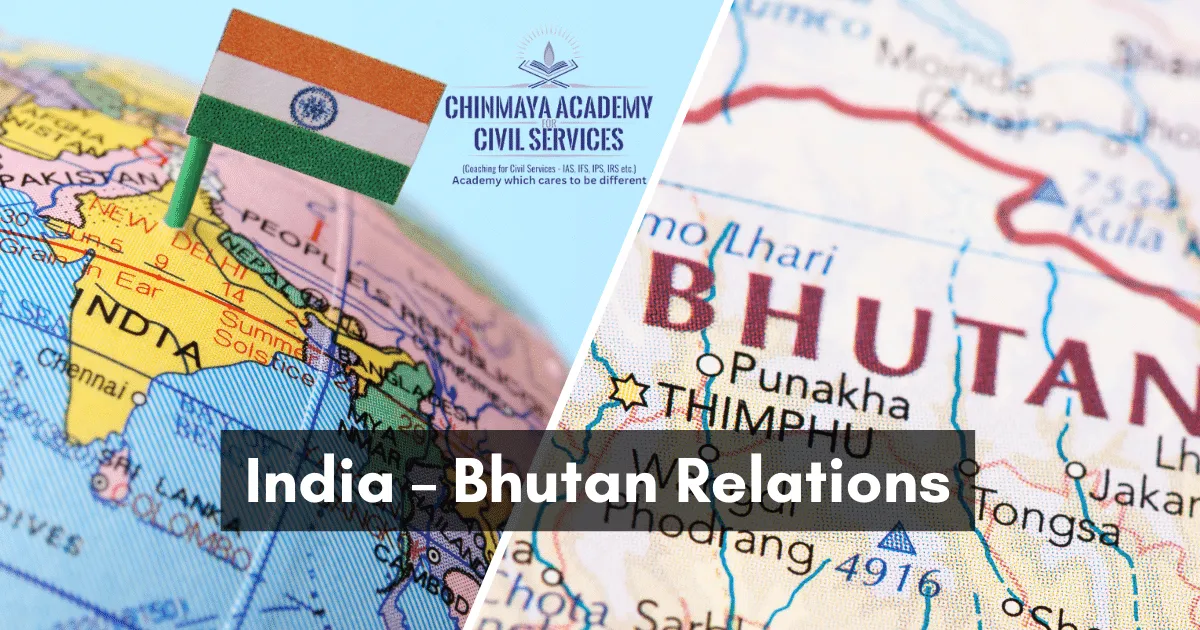
India and Bhutan share a unique and strong bilateral relationship marked by mutual trust, friendship, and cooperation. This special bond has been fostered over decades through regular high-level exchanges, cultural interactions, and a shared commitment to regional peace and stability.
Foundation of the Relationship
With the opening of India’s special office in Thimphu in 1968, diplomatic ties were established between India and Bhutan.
- The 1949 Treaty of Friendship and Cooperation, which was updated in February 2007, serves as the cornerstone of bilateral relations between India and Bhutan.
- 2018 saw the celebration of the Golden Jubilee of the official diplomatic relations between Bhutan and India.
Key Areas of Cooperation
India’s assistance to Bhutan’s socio-economic development has been a hallmark of the bilateral relationship.
- India has provided Bhutan with financial assistance, technical expertise, and capacity building in various sectors, including
- Agriculture
- Education
- Health
- infrastructure development.
- Hydropower cooperation has also been a significant element of the relationship.
Hydropower cooperation
- The bilateral cooperation agreement from 2006 and its Protocol, which was signed in 2009, govern the current hydropower collaboration between Bhutan and India.
- India is now receiving power from four hydroelectric projects (HEPs) in Bhutan, which have a combined capacity of 2136 MW.
- In August 2019, the 720 MW Mangdechhu was put into service.
- There are two HEPs being implemented at different stages: the 1200 MW Punatsangchhu-I, the 1020 MW Punatsangchhu-II in the intergovernmental style, and the 600 MW Kholongchhu HEP under the joint venture mode.
- Finalising the implementation procedures for the 2585 MW Sankosh HEP is now being done in conjunction with the Ministry of Power/DoE.
High-level Exchanges
Regular high-level exchanges between the leaders of India and Bhutan have been instrumental in maintaining the close ties between the two countries.
- Prime Minister Narendra Modi of India has visited Bhutan on multiple occasions, and he has held summits with Bhutan’s King Jigme Singye Wangchuck and his successor, King Jigme Khesar Namgyel Wangchuck.
- These visits have reaffirmed the strength of the bilateral relationship and have provided opportunities to discuss important bilateral and regional issues.
Cultural Exchanges
Cultural exchanges between India and Bhutan have been another important aspect of the bilateral relationship.
- The India-Bhutan Cultural Exchange and Art Camp is a 10-day program where artists from both countries collaborate and learn about each other’s culture.
- The India Bhutan Foundation, established in 2003, aims to promote people-to-people cultural exchange.
- Scholarships: The Indian government provides scholarships to Bhutanese students.
- Education: India is a popular destination for Bhutanese students, with almost 4,000 enrolled in Indian universities at any time.
- Art: India contributed to the cultural growth of Buddhism in Bhutan when Buddhist monk Padmasambhava went from India to Bhutan in 747 AD.
Trade Relations
India is Bhutan’s largest trading partner. And Indian Rupee is legal tender in Bhutan.
- In 2018, total bilateral trade between the two countries stood at Rs. 9227.7 crores.
- Major exports from India to Bhutan – mineral products, machinery and mechanical appliances, electrical equipment, base metals, vehicles, vegetable products, plastics and articles.
- Major items of export from Bhutan to India – electricity, ferro-silicon, portland cement, dolomite, carbides of calcium carbides of silicon, cement clinkers, timber and wood products, potatoes, cardamom and fruit products.
Regional Cooperation
India and Bhutan share a common interest in maintaining peace and stability in the region.
- They have cooperated on a number of issues, including
- Border management
- Security
- Disaster management
- In recent years, they have also deepened their cooperation on climate change and environmental protection.
Way forward:
The India-Bhutan relationship is firmly established and is expected to continue to grow and strengthen in the years to come. The two countries share a common vision for the future and are committed to working together to achieve their shared goals.
This partnership has been instrumental in the development and progress of both countries, and it is expected to play a significant role in the region’s future.
 Chinmaya IAS Academy – Current Affairs Chinmaya IAS Academy – Current Affairs
Chinmaya IAS Academy – Current Affairs Chinmaya IAS Academy – Current Affairs
